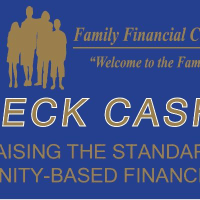Not sure if Family Financial Centers is right for you?
Talk to a Franchise Advisor who can match you with your perfect franchise based on your goals, experience, and investment range.
Talk to an Expert
Family Financial Centers
How much does Family Financial Centers cost?
Initial Investment Range
$153,570 to $308,670
Franchise Fee
$40,500
The franchise relates to the establishment and operation of financial services centers offering check cashing, money orders, wire transfers, electronic bill payments, fax and copier services, tax preparation services, and other financial products offered through third-party vendors.
Enjoy our partial free risk analysis below
Unlock the full risk analysis to access 9 more categories covering 100+ risks.
Family Financial Centers April 3, 2025 FDD Risk Analysis
Free FDD Library AI Analysis Date: August 22, 2025
DISCLAIMER: Not Legal Advice - For Informational Purposes Only. Consult With Qualified Franchise Professionals.
Franchisor Stability Risks
Start HereDisclosure of Franchisor's Financial Instability
High Risk
Explanation
Family Financial Centers, LLC (FFC) explicitly warns of its “General Financial Condition” as a special risk. The audited financial statements in Item 21 confirm this, showing a Members’ Deficit (negative net worth) for the last three consecutive fiscal years, including ($18,817) at the end of 2024. This financial weakness may call into question the franchisor's ability to provide long-term support, invest in the system, or withstand economic challenges, posing a significant risk to your investment.
Potential Mitigations
- Your accountant must conduct a thorough analysis of the franchisor's financial statements, focusing on the causes of the persistent negative net worth and cash flow trends.
- A business advisor can help you assess if the franchisor has sufficient resources to fulfill its support obligations without relying heavily on new franchise sales.
- Discuss the specific implications of the franchisor’s financial state and the explicit “Special Risk” disclosure with your franchise attorney.
High Franchisee Turnover
High Risk
Explanation
The data in Item 20 reveals a concerning trend of franchisee turnover. Over the past two years, the total number of franchised outlets has seen a net decline. In 2024 alone, five units “Ceased Operations for Other Reasons,” representing a churn rate of approximately 9% from the start-of-year total. This level of franchisee departure could suggest potential underlying issues with the business model's profitability, the support system, or overall franchisee satisfaction.
Potential Mitigations
- It is crucial to contact a significant number of former franchisees from the list in Item 20 to understand their reasons for leaving the system.
- Your accountant should help you analyze the turnover rates over the past three years to identify any accelerating negative trends.
- Discuss the specific patterns of terminations and cessations with your business advisor to gauge the potential health of the franchise network.
Rapid System Growth
Low Risk
Explanation
This risk was not identified in the FDD package. The data in Item 20 shows a net decline in the number of franchise units over the last two years, which is the opposite of rapid growth. A franchisor expanding too quickly can strain its ability to provide adequate support to new and existing franchisees.
Potential Mitigations
- An accountant can help you review a franchisor's financial statements to assess if they have the capital and staff to support their stated growth.
- Engaging a business advisor to question current franchisees about the quality and timeliness of support can reveal if a system is overstretched.
- Your attorney should review the franchisor's obligations in Item 11 to ensure support commitments are specific and not overly discretionary.
New/Unproven Franchise System
Low Risk
Explanation
This risk was not identified in the FDD package. FFC has been franchising since 2004, as stated in Item 1. Therefore, it is an established system, not a new or unproven one. Investing in a new franchise system carries higher risks due to the lack of a proven track record, brand recognition, and developed support systems.
Potential Mitigations
- When evaluating a newer system, it is wise to have your attorney scrutinize the business and franchising experience of its management team in Item 2.
- A business advisor can help assess the viability and capitalization of a new franchise concept.
- An accountant should review the financials of any new franchisor to determine if it is sufficiently capitalized to support its initial growth.
Possible Fad Business
Low Risk
Explanation
This risk was not identified in the FDD package. The business model, which focuses on financial services like check cashing and money transfers, is an established industry and does not appear to be based on a short-term trend or fad. Fad-based businesses can pose a significant risk, as their long-term viability may be uncertain once consumer interest diminishes.
Potential Mitigations
- Before investing, you should always conduct market research with a business advisor to assess the long-term consumer demand for a franchise's products or services.
- Your accountant can help evaluate the business model's resilience to economic shifts and changing consumer tastes.
- Discuss the franchisor's plans for innovation and adaptation with your attorney to ensure the business is not reliant on a single, fleeting trend.
Inexperienced Management
Low Risk
Explanation
This risk was not identified in the FDD package. The executive biographies in Item 2 indicate that the key management personnel have substantial experience, with several, including the CEO, having been with the company since its inception in 2004. Inexperienced management can be a significant risk, potentially leading to poor strategic decisions and inadequate support for franchisees.
Potential Mitigations
- It is always prudent to have a business advisor help you research the backgrounds of the franchisor's key executives listed in Item 2.
- Speaking with current franchisees can provide valuable insight into the competence and effectiveness of the management team.
- Your attorney can help you understand the management team's experience in both the specific industry and in franchising.
Private Equity Ownership
Low Risk
Explanation
This risk was not identified in the FDD package. Item 1 does not indicate that the franchisor is owned or controlled by a private equity firm. Private equity ownership can sometimes lead to a focus on short-term profits over the long-term health of the franchise system, potentially affecting franchisee support and fee structures.
Potential Mitigations
- Should you encounter a PE-owned franchisor, your business advisor should research the firm's history with other franchise brands.
- It is important to discuss with your attorney how a potential sale of the franchise system by a PE firm could impact your rights.
- Your accountant can analyze financials to see if cost-cutting in franchisee support has occurred following a PE acquisition.
Non-Disclosure of Parent Company
Low Risk
Explanation
This risk was not identified in the FDD package. FFC discloses its parent company, Family Financial Centers, Inc., in Item 1. The FDD provides audited financial statements for the franchisor entity itself. Failure to disclose a parent company or provide its financials when it guarantees the franchisor's performance can obscure the true financial stability of the system.
Potential Mitigations
- Your attorney should verify that if a parent company's guarantee is offered, their financial statements are included in Item 21 as required.
- An accountant can help you assess the financial strength of a parent company and the real value of any performance guarantee it provides.
- When a franchisor is a small subsidiary, a business advisor can help investigate the stability and commitment of the parent organization.
Predecessor History Issues
Low Risk
Explanation
This risk was not identified in the FDD package. Item 1 of the FDD states that FFC has no predecessors. When a franchisor has predecessors, it is important to review their history for any signs of trouble, such as litigation or bankruptcy, as these could indicate underlying problems with the business system that may have been inherited.
Potential Mitigations
- For any franchise, your attorney should carefully review Item 1 for any mention of predecessors.
- If predecessors are listed, a business advisor can help you conduct independent research on their history and reputation.
- It's wise to ask long-term franchisees about their experience under any previous ownership.
Pattern of Litigation
Low Risk
Explanation
This risk was not identified in the FDD package. Item 3 states, “No litigation is required to be disclosed in this Item.” A pattern of litigation, particularly lawsuits initiated by franchisees alleging fraud or misrepresentation, can be a major red flag indicating systemic problems within a franchise.
Potential Mitigations
- It's always recommended to have your attorney review Item 3 to understand the nature of any disclosed litigation.
- A business advisor can help you investigate the context of any lawsuits by speaking with current and former franchisees.
- Your accountant can help assess the potential financial impact on the franchisor of any significant pending litigation.
Disclosure & Representation Risks
Example Risk: Franchisee Financial Obligations
Blue Risk
Explanation
This risk involves the financial obligations that a franchisee must meet, including initial fees, ongoing royalties, and other required payments. Understanding these obligations is crucial for long-term success.
Potential Mitigations
- Carefully review the Franchise Disclosure Document (FDD) and consult with a franchise attorney to fully understand all financial commitments before signing.
- Conduct regular risk assessments
- Implement monitoring and reporting systems
Unlock Full Risk Analysis
Purchase the complete risk review to see all 102 risks across all 10 categories.
Financial & Fee Risks
Example Risk: Franchisee Financial Obligations
Blue Risk
Explanation
This risk involves the financial obligations that a franchisee must meet, including initial fees, ongoing royalties, and other required payments. Understanding these obligations is crucial for long-term success.
Potential Mitigations
- Carefully review the Franchise Disclosure Document (FDD) and consult with a franchise attorney to fully understand all financial commitments before signing.
- Conduct regular risk assessments
- Implement monitoring and reporting systems
Unlock Full Risk Analysis
Purchase the complete risk review to see all 102 risks across all 10 categories.
Legal & Contract Risks
Example Risk: Franchisee Financial Obligations
Blue Risk
Explanation
This risk involves the financial obligations that a franchisee must meet, including initial fees, ongoing royalties, and other required payments. Understanding these obligations is crucial for long-term success.
Potential Mitigations
- Carefully review the Franchise Disclosure Document (FDD) and consult with a franchise attorney to fully understand all financial commitments before signing.
- Conduct regular risk assessments
- Implement monitoring and reporting systems
Unlock Full Risk Analysis
Purchase the complete risk review to see all 102 risks across all 10 categories.
Territory & Competition Risks
Example Risk: Franchisee Financial Obligations
Blue Risk
Explanation
This risk involves the financial obligations that a franchisee must meet, including initial fees, ongoing royalties, and other required payments. Understanding these obligations is crucial for long-term success.
Potential Mitigations
- Carefully review the Franchise Disclosure Document (FDD) and consult with a franchise attorney to fully understand all financial commitments before signing.
- Conduct regular risk assessments
- Implement monitoring and reporting systems
Unlock Full Risk Analysis
Purchase the complete risk review to see all 102 risks across all 10 categories.
Regulatory & Compliance Risks
Example Risk: Franchisee Financial Obligations
Blue Risk
Explanation
This risk involves the financial obligations that a franchisee must meet, including initial fees, ongoing royalties, and other required payments. Understanding these obligations is crucial for long-term success.
Potential Mitigations
- Carefully review the Franchise Disclosure Document (FDD) and consult with a franchise attorney to fully understand all financial commitments before signing.
- Conduct regular risk assessments
- Implement monitoring and reporting systems
Unlock Full Risk Analysis
Purchase the complete risk review to see all 102 risks across all 10 categories.
Franchisor Support Risks
Example Risk: Franchisee Financial Obligations
Blue Risk
Explanation
This risk involves the financial obligations that a franchisee must meet, including initial fees, ongoing royalties, and other required payments. Understanding these obligations is crucial for long-term success.
Potential Mitigations
- Carefully review the Franchise Disclosure Document (FDD) and consult with a franchise attorney to fully understand all financial commitments before signing.
- Conduct regular risk assessments
- Implement monitoring and reporting systems
Unlock Full Risk Analysis
Purchase the complete risk review to see all 102 risks across all 10 categories.
Operational Control Risks
Example Risk: Franchisee Financial Obligations
Blue Risk
Explanation
This risk involves the financial obligations that a franchisee must meet, including initial fees, ongoing royalties, and other required payments. Understanding these obligations is crucial for long-term success.
Potential Mitigations
- Carefully review the Franchise Disclosure Document (FDD) and consult with a franchise attorney to fully understand all financial commitments before signing.
- Conduct regular risk assessments
- Implement monitoring and reporting systems
Unlock Full Risk Analysis
Purchase the complete risk review to see all 102 risks across all 10 categories.
Term & Exit Risks
Example Risk: Franchisee Financial Obligations
Blue Risk
Explanation
This risk involves the financial obligations that a franchisee must meet, including initial fees, ongoing royalties, and other required payments. Understanding these obligations is crucial for long-term success.
Potential Mitigations
- Carefully review the Franchise Disclosure Document (FDD) and consult with a franchise attorney to fully understand all financial commitments before signing.
- Conduct regular risk assessments
- Implement monitoring and reporting systems
Unlock Full Risk Analysis
Purchase the complete risk review to see all 102 risks across all 10 categories.
Miscellaneous Risks
Example Risk: Franchisee Financial Obligations
Blue Risk
Explanation
This risk involves the financial obligations that a franchisee must meet, including initial fees, ongoing royalties, and other required payments. Understanding these obligations is crucial for long-term success.
Potential Mitigations
- Carefully review the Franchise Disclosure Document (FDD) and consult with a franchise attorney to fully understand all financial commitments before signing.
- Conduct regular risk assessments
- Implement monitoring and reporting systems
Unlock Full Risk Analysis
Purchase the complete risk review to see all 102 risks across all 10 categories.




